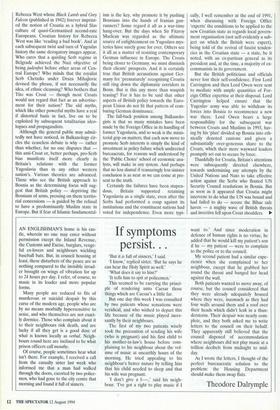THE GAME IS UP
Robin Harris takes issue with
British 'anti-Croat invective' — and attempts to redress the balance
UNMISTAKABLY, and to those who know this son of Peterhouse, unnervingly, it was there: a quiver of moral indignation. The Defence Secretary, Michael Portillo, was at last moved by the spectacle of the Balkan tragedy to go beyond considera- tions of realpolitik to true moral indigna- tion. Asked by an interviewer on the World at One to comment on the suggestions by President Clinton and Secretary of State Christopher that the Croatian offensive which had taken rebel Serb Krajina would lead to a better chance for a settlement in the former Yugoslavia, Mr Portillo declaimed against the 'ethnic cleansing' of `hundreds of thousands' by the Croats. This, he rebuked the Americans, was not a way to a just peace.
Forget for a minute that the 'hundreds of thousands' of ethnically cleansed Krajina Serbs would be difficult to locate, given that the total Serb population of the region was in the range of 150,000 at the start of the conflict in 1991, and many of those had subsequently fled the gangster-ridden deprivations of life in that woe-begotten, poverty stricken region. Forget too that, if `ethnic cleansing' means anything, it means the forced expulsions of civilians from a region in which stability rather than war prevails; otherwise we are talking simply about civilians fleeing a conflict, an emi- nently sensible response to howitzers which UN troops might have been well advised to emulate. As of the time of writing, there is no evidence of forced expulsions. In fact, although it is seldom reported, Croatia has pledged that those who wish to return to their homes (as opposed to the homes of the 20 per cent non-Serb population ethni- cally cleansed by the Serbs) may do so.
The ignorance of Mr Portillo is less sur- prising than the alacrity with which he chose to intervene beyond his brief. Admit- tedly, Mr Portillo has a pro-Serb adviser, David Hart (whose article urging that `[the Serbs] are the only people capable of imposing some kind of stability in the area' appeared in this magazine in January 1993). But Michael Portillo is, essentially and admirably, if sometimes exaggeratedly, English in his reactions. His passionate anti-Croat prejudice is of interest not just because of its mouthpiece but because of its source. And the latter is deep-rooted in English experience.
Croats are, it is fair to say, not tradition- ally well-loved by the British. They were, for example, scathingly depicted in 19th- century English literature as equivalents of the (still less 'civilised') Serbs — bearded, bellicose and semi-barbaric. But it was 'Oh no! Home, home on the range where the deer and the antelope play - a hypodermic syringe?' Rebecca West whose Black Lamb and Grey Falcon (published in 1942) forever imprint- ed the notion of Croatia as a hybrid Slav culture of quasi-Germanised second-rate Europeans. Croatian history for Rebecca West was like 'reading a bad book'. And at each subsequent twist and turn of Yugoslav history the same derogatory images appear. Who cares that a quisling Serb regime in Belgrade achieved the Nazi objective of being judenfrei before other areas of Cen- tral Europe? Who minds that the royalist Serb Chetniks under Draza Mihajlovic devised the phrase, if not necessarily the idea, of ethnic cleansing? Who bothers that Tito was Croat — though most Croats would not regard that fact as an advertise- ment for their nation? The old myths, which like other powerful myths have a real if distorted basis in fact, live on to be exploited by subsequent totalitarian ideo- logues and propagandists.
Although the general public may admit- tedly not have noticed, in Balkanology cir- cles the ceaseless debate is why — rather than whether, for no one disputes that this anti-Croat or, better perhaps, pro-Serb bias manifests itself more clearly in Britain's relations with the former Yugoslavia than in any other western nation's. Various theories are advanced. Those who see the British approach to Bosnia as the determining focus will sug- gest that British policy — depriving the Bosnians of arms, pressing on them territo- rial concessions — is guided by the refusal to have a predominantly Muslim state in Europe. But if fear of Islamic fundamental- ism is the key, why promote it by pushing Bosnians into the hands of Iranian gun- runners? Some regard it all as a war-time hang-over. But the days when Sir Fitzroy Maclean was regarded as the ultimate source of enlightenment on Yugoslays mys- teries have surely gone for ever. Others see it all as a matter of resisting contemporary German influence in Europe. The Croats being closer to Germany, we must diminish their clients' prospects. And it is certainly true that British accusations against Ger- many for 'prematurely' recognising Croatia still ring down the diplomatic corridors in Bonn. But is this any more than waspish teasing? For it has to be said that other aspects of British policy towards the Euro- pean Union do not fit that pattern of com- bating German dominance.
The fall-back position among Balkan°lo- gists is that so many mistakes have been made by the Foreign Office in its handling of former Yugoslavia, and so weak is the minis- terial grip on matters, that each new move to promote Serb interests is simply the kind of investment in policy failure which undirected bureaucrats, for reasons well understood by the 'Public Choice' school of economic ana- lysts, will make in any system. And perhaps that no less dismal if reassuringly less sinister conclusion is as near as we can come at pre- sent to the truth.
Certainly the failures have been stupen- dous. Britain supported retaining Yugoslavia as a single state, even after the Serbs had performed a coup against its institutions and the constituent nations had voted for independence. Even more typi- cally, I well remember at the end of 1991, when discussing with Foreign Office 'experts' the conditions to be applied to the new Croatian state as regards local govern- ment organisation (not self-evidently a sub- ject on which the British were expert), being told of the revival of fascist tenden- cies in the Croatian state — a state, be it noted, with an ex-partisan general as its president and, at the time, a majority of ex- communists in its government.
But the British politicians and officials never lost their self-confidence. First Lord Carrington and then Lord Owen were sent to mediate with ample quantities of For- eign Office expertise at their disposal. Lord Carrington helped ensure that the Yugoslav army was able to withdraw its forces into Bosnia to recommence a new war there. Lord Owen bears a large responsibility for the subsequent war between Croats and Muslims in 1993, hav- ing by his 'plan' divided up Bosnia into eth- nically denoted cantons and given a substantially over-generous share to the Croats, which their more wayward leaders promptly set out to secure by force.
Thankfully for Croatia, Britain's attentions were subsequently directed elsewhere, towards undermining any attempts by the United Nations and Nato to take effective action against the Serbs who flouted UN Security Council resolutions in Bosnia. But as soon as it appeared that Croatia might intervene to do what the UN was bound and had failed to do — secure the Bihac safe haven — a mighty wave of British threats and invective fell upon Croat shoulders. ► But now the British game is up. The fate of Bosnia is still in the balance. But Croatia is secure. The Croats have no doubt that it is the Germans and Americans that have enabled this and that it is the British who consistently sought their destruction. This will sour inter-governmental relations for years. It will also disadvantage British business.
But, oddly enough, it need not perturb British visitors. Although the Croats know they have had to combat the British powers that be, they have a lively appreciation of the powers which were — for no one inspires greater affection than those appar- ently contrasting, yet morally symmetric, quintessentially English characters who have spoken out for Croatia more elo- quently than any German or American Margaret Thatcher and Michael Foot.




















































 Previous page
Previous page